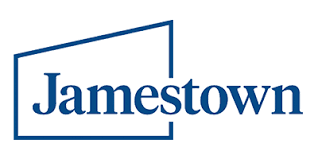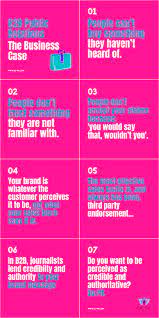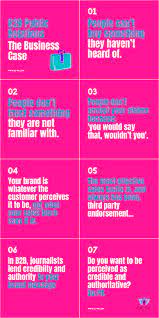B2B PR: Building Strong Connections in the Business World
In the fast-paced and competitive business landscape, effective communication plays a crucial role in building strong connections and driving success. B2B PR, or Business-to-Business Public Relations, is a strategic approach that focuses on establishing and nurturing relationships between businesses.
Unlike traditional PR, which primarily targets consumers, B2B PR aims to engage with key decision-makers, industry influencers, and stakeholders within the business community. It involves crafting compelling messages and delivering them through various channels to enhance brand reputation, generate leads, and foster mutually beneficial partnerships.
One of the key objectives of B2B PR is to position a company as an industry thought leader. By sharing valuable insights and expertise through media placements, guest articles, or speaking engagements at industry events, businesses can establish credibility and gain trust among their target audience. This helps build a positive reputation for the brand while also attracting potential partners or customers.
Another important aspect of B2B PR is media relations. Building relationships with relevant journalists and media outlets can help businesses secure valuable coverage in industry-specific publications or platforms. This exposure not only increases brand visibility but also enhances credibility by leveraging third-party endorsements.
In addition to media relations, B2B PR involves strategic content creation. This includes developing informative blog posts, whitepapers, case studies, or research reports that address industry challenges or provide solutions. By sharing these resources with target audiences through digital platforms or direct outreach campaigns, businesses can position themselves as trusted advisors and generate leads.
Social media also plays a significant role in B2B PR. Platforms like LinkedIn provide opportunities for businesses to connect with decision-makers directly. By creating engaging content that resonates with their target audience’s pain points or interests, companies can foster meaningful conversations and establish themselves as industry experts.
Furthermore, B2B PR encompasses crisis communication management. In times of unexpected challenges or negative publicity, having a well-prepared crisis communication plan is essential. B2B PR professionals can help businesses navigate through difficult situations, protect their reputation, and rebuild trust with stakeholders.
In conclusion, B2B PR is a strategic approach that focuses on building strong connections and fostering relationships within the business community. By positioning a company as an industry thought leader, engaging with relevant media outlets, creating valuable content, and leveraging social media platforms, businesses can enhance their brand reputation, generate leads, and drive success in the competitive B2B landscape.
If you’re looking to strengthen your business’s communication strategy and build meaningful connections within your industry, consider incorporating B2B PR into your overall marketing efforts. With the right approach and expertise, B2B PR can become a powerful tool in driving growth and establishing your brand as a trusted leader in the business world.
5 Essential Tips for B2B PR Success in the UK
- Focus on providing value
- Utilise multiple channels
- Build relationships
- Track results
- Develop a strategy
Focus on providing value
When it comes to B2B PR, one tip stands out as a guiding principle: focus on providing value. In the business world, where time is valuable and attention spans are short, delivering meaningful and relevant content is key to capturing the attention of your target audience.
Businesses are constantly seeking solutions to their challenges and looking for partners who can help them succeed. By offering valuable insights, expertise, and resources through your PR efforts, you position yourself as a trusted advisor and establish credibility within your industry.
To provide value in your B2B PR efforts, start by understanding your target audience’s pain points, needs, and interests. Conduct research and gather insights to gain a deep understanding of their challenges and how you can address them. This will allow you to tailor your messages and content specifically to their needs.
Consider creating informative blog posts, whitepapers, case studies, or research reports that provide actionable advice or solutions. Share these resources through various channels such as your website, social media platforms, or targeted email campaigns. By offering practical insights and actionable takeaways, you position yourself as a valuable resource that businesses can turn to for guidance.
In addition to written content, explore other formats such as webinars or podcasts where you can share industry knowledge or interview experts in your field. These formats provide an opportunity for businesses to learn from you directly while also showcasing your expertise.
Remember that providing value goes beyond just sharing information. Actively engage with your audience by responding to comments on social media posts or blog articles. Be open to answering questions or offering further assistance when needed. This level of engagement builds trust and fosters a sense of community around your brand.
By focusing on providing value in your B2B PR efforts, you not only attract the attention of potential partners or customers but also establish long-term relationships built on trust and mutual benefit. Your commitment to delivering meaningful content sets you apart from competitors who may be solely focused on self-promotion.
In conclusion, when it comes to B2B PR, the tip to focus on providing value is a game-changer. By understanding your target audience’s needs and challenges, creating valuable content, and actively engaging with your audience, you position yourself as a trusted advisor and build strong connections within your industry. Remember, in the world of B2B PR, value is the key to success.
Utilise multiple channels
Utilise Multiple Channels: Maximising the Reach of B2B PR
In the dynamic world of B2B PR, one key tip stands out: utilise multiple channels. With an ever-expanding array of communication platforms available, businesses can significantly enhance their reach and impact by diversifying their approach.
Gone are the days when traditional media outlets were the sole focus of PR efforts. While they still hold importance, today’s B2B PR professionals understand the need to embrace a multi-channel strategy that encompasses both traditional and digital mediums.
By utilising multiple channels, businesses can effectively engage with their target audience across various touchpoints. Here are some key channels to consider:
- Traditional Media: Newspapers, magazines, trade publications, and broadcast media still hold significant influence in many industries. Securing coverage in these outlets can provide valuable exposure and credibility for your brand. Maintaining relationships with journalists and pitching relevant stories is essential to maximise your chances of securing media placements.
- Digital Publications: With the rise of online media outlets and industry-specific blogs, digital publications offer a vast range of opportunities for B2B PR. Contributing guest articles or thought leadership pieces to reputable online platforms can help position your brand as an industry expert while reaching a wider audience.
- Social Media Platforms: Social media has revolutionised the way businesses communicate with their audience. Platforms like LinkedIn, Twitter, and Facebook allow companies to share news, insights, and engage directly with their target market. By creating compelling content tailored to each platform’s unique features, businesses can amplify their reach and build meaningful connections.
- Industry Events: Participating in industry conferences, trade shows, or webinars provides an excellent opportunity for networking and showcasing expertise. Speaking engagements or hosting workshops at these events can help establish your brand as a thought leader while connecting with potential partners or clients face-to-face.
- Content Marketing: Creating informative and valuable content through blog posts, whitepapers, case studies, or videos can attract and engage your target audience. Distributing this content through your website, email newsletters, and social media channels can generate leads and establish your brand’s authority in the industry.
- Influencer Partnerships: Collaborating with industry influencers or experts can significantly expand your reach. By leveraging their credibility and audience, you can tap into new markets or niches that align with your business objectives.
Remember, a successful multi-channel approach requires a consistent brand voice and messaging across all platforms. Tailor your content to suit each channel’s specific requirements while maintaining a cohesive brand identity.
In conclusion, utilising multiple channels is a powerful strategy for maximising the reach of B2B PR efforts. By diversifying your approach and tapping into traditional media outlets, digital publications, social media platforms, industry events, content marketing initiatives, and influencer partnerships, you can effectively engage with your target audience at various touchpoints. Embrace the opportunities that these channels offer to enhance brand visibility, establish thought leadership, and drive success in the competitive B2B landscape.
Build relationships
Building Relationships: The Key to Successful B2B PR
In the world of B2B PR, one tip stands out above the rest: build relationships. While it may seem like an obvious concept, the power of strong connections cannot be underestimated when it comes to driving success in business-to-business public relations.
Building relationships is at the core of effective B2B PR strategies. It goes beyond simply pitching stories or promoting products; it involves cultivating genuine connections with key stakeholders, industry influencers, and potential partners. These relationships form the foundation for trust, credibility, and long-term success.
One of the first steps in building relationships is understanding your target audience. Take the time to research and identify the individuals or organizations that align with your business objectives. By knowing their needs, challenges, and interests, you can tailor your communication efforts to resonate with them effectively.
Once you have identified your target audience, engage with them on a personal level. Attend industry events, conferences or networking opportunities where you can meet face-to-face and establish meaningful connections. Actively listen to their perspectives and show genuine interest in their work. This helps create a solid foundation for ongoing communication.
Another effective way to build relationships is through thought leadership initiatives. Share valuable insights and expertise through various channels such as guest articles, speaking engagements or webinars. By positioning yourself as an industry expert who provides valuable information, you can attract attention from key decision-makers and influencers within your target market.
Maintaining regular communication is crucial in nurturing these relationships over time. Keep in touch through personalized emails, newsletters or social media interactions. Share relevant content that adds value to their professional lives or addresses their pain points. This consistent engagement helps solidify your position as a trusted partner rather than just another business seeking transactions.
Collaboration is also a powerful tool in building relationships within B2B PR. Seek opportunities for partnerships or joint projects with complementary businesses or industry associations. By working together towards a shared goal, you can not only expand your network but also leverage each other’s expertise and resources for mutual benefit.
Finally, always prioritize the human element in your B2B PR efforts. Remember that behind every business decision or industry trend, there are individuals with their own goals and aspirations. Show empathy, respect, and authenticity in your interactions. Building genuine relationships based on trust and mutual respect will set you apart from competitors and create a strong foundation for long-term success.
In conclusion, building relationships is an essential tip for successful B2B PR. By understanding your target audience, engaging on a personal level, showcasing thought leadership, maintaining regular communication, seeking collaboration opportunities and prioritizing the human element, you can establish strong connections that drive credibility, trust and business growth. Embrace the power of relationships in your B2B PR strategy – it’s the key to unlocking success in today’s competitive business landscape.
Track results
Track Results: The Key to Successful B2B PR Campaigns
In the realm of B2B PR, tracking results is an essential practice that can make all the difference in the success of your campaigns. While strategic planning, engaging content, and effective communication are crucial elements, without tracking and analyzing the outcomes, it becomes difficult to measure progress and make informed decisions for future initiatives.
Tracking results allows you to gain valuable insights into the impact of your B2B PR efforts. By monitoring key performance indicators (KPIs) such as media coverage, website traffic, social media engagement, lead generation, or conversion rates, you can assess the effectiveness of your strategies and identify areas for improvement.
One of the primary benefits of tracking results is the ability to measure brand exposure. By monitoring media coverage and mentions in relevant publications or online platforms, you can gauge how well your brand is being recognized and associated with industry expertise. This information helps you understand which channels or tactics are generating the most visibility for your business.
Tracking results also enables you to assess audience engagement. By analyzing metrics such as website traffic, social media interactions, or email open rates, you can evaluate how well your content resonates with your target audience. This data provides valuable insights into what types of messages or topics are most appealing and helps shape future content strategies.
Furthermore, tracking results allows you to measure lead generation and conversion rates. By monitoring how many leads are generated through PR efforts and how many of those leads convert into customers or clients, you can determine the ROI (Return on Investment) of your B2B PR campaigns. This information helps justify investment in PR activities and guides resource allocation for future initiatives.
In addition to quantitative data, tracking results also involves qualitative analysis. Monitoring sentiment analysis or feedback from key stakeholders provides a deeper understanding of how your brand is perceived in the market. This information can help identify potential issues or areas where adjustments may be needed to improve reputation or address concerns.
By consistently tracking results, you can make data-driven decisions and refine your B2B PR strategies. It allows you to identify what’s working and what needs improvement, enabling you to optimize your efforts for better outcomes. Tracking results also provides a basis for reporting and demonstrating the value of PR activities to stakeholders or management.
In conclusion, tracking results is an integral part of successful B2B PR campaigns. By monitoring key metrics, assessing brand exposure, evaluating audience engagement, measuring lead generation and conversion rates, and analyzing qualitative feedback, you can gain valuable insights that inform future strategies. Embracing a data-driven approach helps ensure that your B2B PR efforts are effective, impactful, and aligned with your business objectives.
Develop a strategy
Develop a Strategy: The Key to Successful B2B PR
In the world of B2B PR, having a well-defined strategy is essential for achieving success. A carefully crafted plan ensures that your efforts are focused, targeted, and aligned with your business goals. It lays the foundation for effective communication and helps you navigate the complex landscape of business-to-business relations.
A successful B2B PR strategy begins with a clear understanding of your target audience. Identify who your ideal customers or clients are, what challenges they face, and how your products or services can address their needs. This knowledge will enable you to tailor your messaging and communication tactics specifically to resonate with this audience.
Next, define your goals and objectives. Are you looking to increase brand awareness within your industry? Generate leads? Position yourself as an industry thought leader? Having specific, measurable goals will guide your strategy and allow you to track progress along the way.
Once you have identified your target audience and established clear goals, it’s time to determine the best channels and tactics to reach them. This could include media relations, content creation, social media engagement, thought leadership initiatives, or a combination of these approaches. Each tactic should be carefully selected based on its relevance to your audience and its potential impact on achieving your goals.
In addition to selecting tactics, developing a timeline is crucial. Determine when certain activities need to take place and set realistic deadlines for each milestone. This will help keep you accountable and ensure that your strategy moves forward in a timely manner.
Measurement is another critical aspect of any successful B2B PR strategy. Establish key performance indicators (KPIs) that align with your goals and regularly measure progress against these metrics. This will allow you to assess the effectiveness of your efforts and make adjustments as needed.
Lastly, remember that a B2B PR strategy is not set in stone. As the business landscape evolves and new opportunities arise, be open to adapting your approach. Regularly evaluate the results of your strategy and be willing to make changes based on feedback and market trends.
In conclusion, developing a well-thought-out strategy is the key to successful B2B PR. By understanding your target audience, setting clear goals, selecting the right tactics, establishing a timeline, measuring progress, and being open to adjustments, you can create a roadmap for effective communication that drives results. Invest time and effort into developing your B2B PR strategy, and you’ll be on your way to building strong connections and achieving success in the business world.






